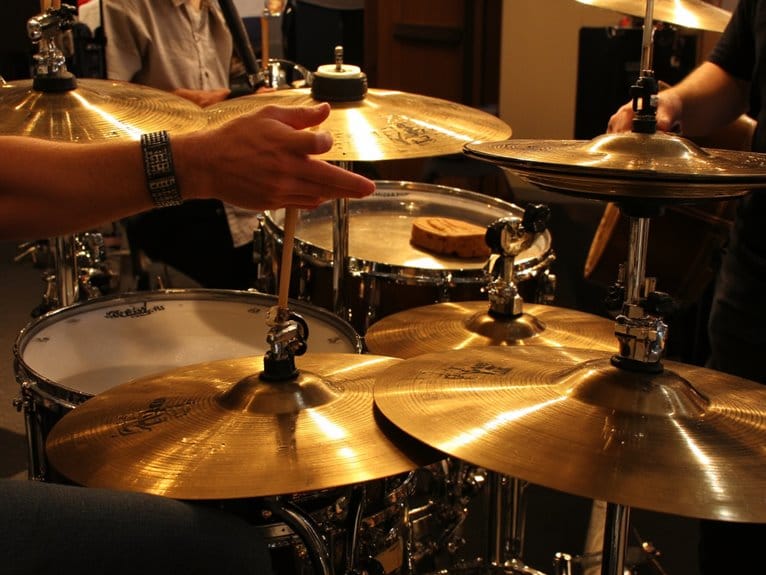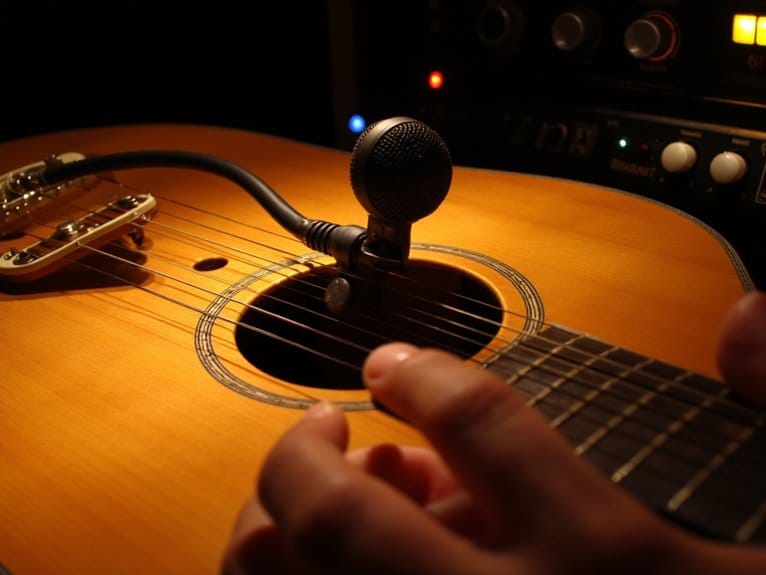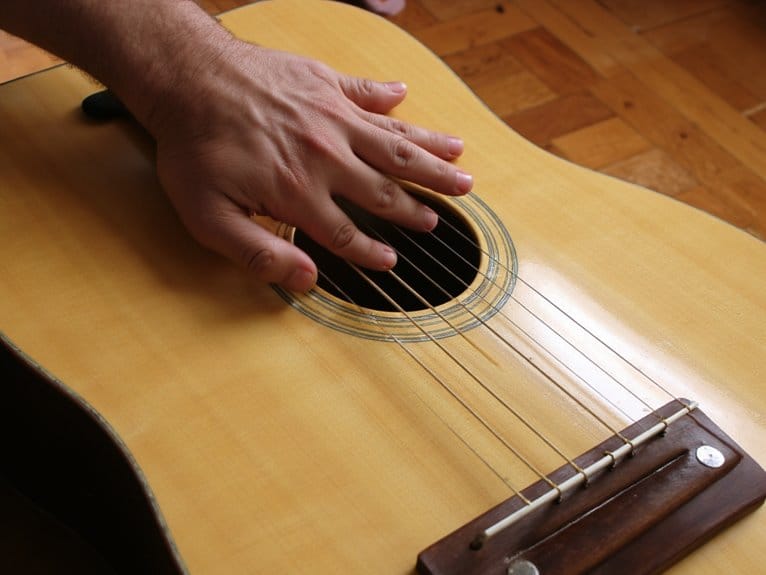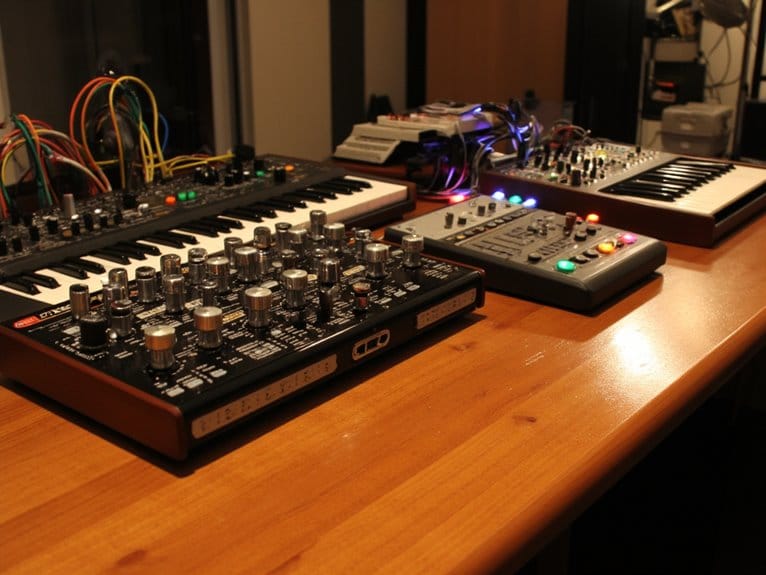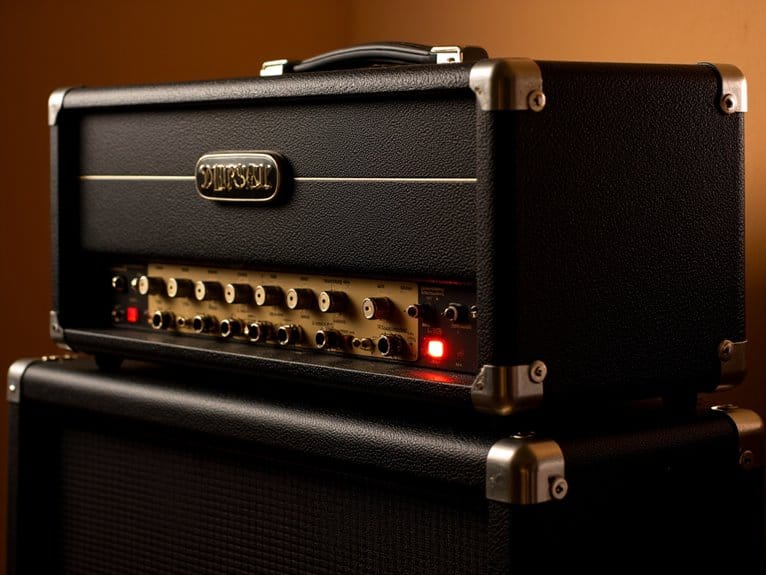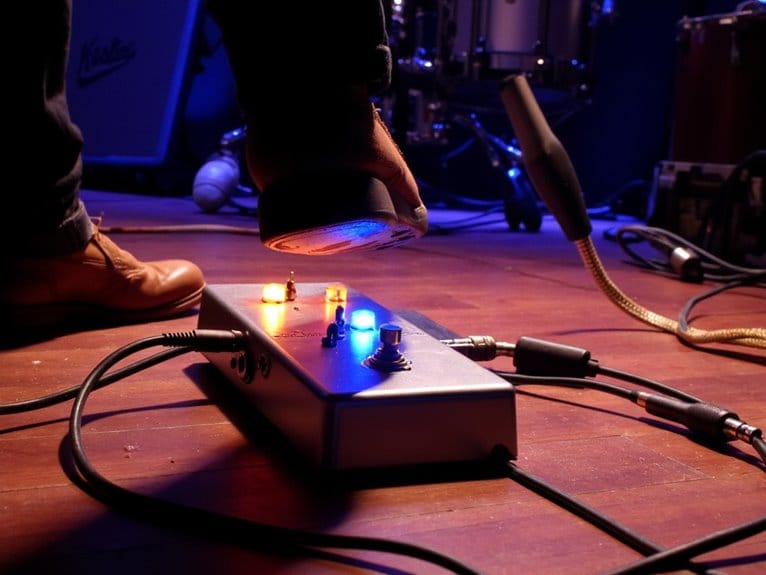Cymbal Selection Without Breaking the Bank or Your Ears
You don’t need to empty your wallet for quality cymbals when brands like Meinl’s HCS series and Istanbul Agop’s Xist line offer professional-grade sound at budget prices. Focus on essential types first—hi-hats, crash, and ride—while choosing B8 bronze alloys for bright, focused tones that cut through dense mixes without harsh frequencies. Proper mounting with felts and tilted angles protects your investment from stress cracks, and cymbal packs typically save 20-30% over individual purchases while ensuring tonal compatibility that’ll transform your kit’s sonic character.
We are supported by our audience. When you purchase through links on our site, we may earn an affiliate commission, at no extra cost for you. Learn more.
Notable Insights
- Choose budget-friendly brands like Meinl HCS or Wuhan Koi that offer quality alloys and good reviews under $300.
- Buy cymbal packs instead of individual pieces to save 20-30% while ensuring matched tonal harmony across your kit.
- Select B8 bronze alloys for brighter, focused sounds that cut through dense mixes without overpowering other instruments.
- Match cymbal characteristics to your musical style—jazz needs dark warmth while rock requires aggressive attack and projection.
- Use proper mounting techniques with felts and plastic sleeves to prevent cracking and extend cymbal lifespan significantly.
Budget-Friendly Cymbal Brands That Deliver Quality Sound
While finding quality cymbals on a budget might seem like searching for a needle in a haystack, I’ve discovered that several manufacturers consistently deliver impressive sound without breaking the bank.
Meinl’s HCS series offers acceptable sound quality for beginners, utilizing brass alloy construction that provides durability without the complexity of bronze alternatives. The HCS Traditional Ride Cymbal delivers clean, bright tones with strong ping articulation and maintains a 4.7-star rating from over 500 reviews.
Brass alloy construction delivers reliable durability and straightforward sound characteristics, making these cymbals an ideal starting point for developing drummers.
Wuhan’s Koi Big Cymbal Set delivers vintage, warm tones reminiscent of traditional Chinese cymbals, making them perfect for moderate volume settings.
Istanbul Agop’s Xist Brilliant series provides authentic Turkish cymbal characteristics with thinner profiles that create quick response and rich wash.
Many manufacturers offer symbol packs that provide significant cost savings compared to purchasing individual cymbals, making professional-quality setups more accessible to budget-conscious drummers. VEVOR’s stainless steel sets offer surprising brightness at budget prices, making them an excellent option for drummers seeking affordability without sacrificing sound quality.
For those practicing in shared living spaces, low-volume options reduce noise by 60-80% while maintaining the authentic feel needed for skill development.
These budget cymbals prove that you don’t need to sacrifice essential sound quality when working within financial constraints. The right choice supports long-term drumming aspirations and helps establish a solid foundation for your musical development.
Understanding Alloy Types and Their Impact on Tone
When you’re diving deeper into cymbal selection, understanding the metallurgical foundation becomes essential since the alloy composition directly shapes every aspect of your cymbal’s voice, sustain, and overall character.
Bell bronze, containing 80% copper and 20% tin, delivers the richest tonal characteristics with complex overtones and extended sustain that professionals prize. B8 bronze, with its 92% copper and 8% tin ratio, produces brighter, more focused sounds perfect for cutting through dense mixes.
The higher tin content in B20 creates a harder, more brittle metal that requires specialized cymbal manufacturing techniques, often involving hand-hammering rather than machine production. This complexity explains why B20 cymbals cost more but offer superior dynamic range and tonal versatility across musical styles.
Hand-hammered cymbals offer superior sonic complexity and controlled wash that particularly benefits jazz musicians seeking subtle dynamic expression.
Some manufacturers enhance their bell bronze formulations by incorporating small amounts of silver, gold, and phosphorus to further refine the tonal characteristics and manufacturing properties.
Essential Cymbal Types Every Drummer Needs
Building your cymbal collection requires understanding the five essential types that form the foundation of any professional drum kit, and I’ve learned through years of playing that each serves a distinct musical purpose you can’t replicate with substitutions.
| Cymbal Type | Primary Function |
|---|---|
| Hi-Hat | Rhythmic foundation and groove anchor |
| Crash | Powerful accents and phrase punctuation |
| Ride | Steady patterns and tonal foundation |
| Splash | Quick, subtle accents and effects |
These essential cymbal types cover your basic cymbal functions completely. Hi-hats provide your rhythmic backbone through their versatile open and closed sounds, while crashes deliver explosive accents for dynamic emphasis. Rides maintain steady patterns with their sustained tones, and splashes add delicate color without overwhelming your mix. Understanding these fundamental roles helps you prioritize purchases and build a balanced setup. When selecting hi-hats specifically, brass construction delivers bright, cutting sounds that work well for beginners, while bronze alloys offer the warmth and richness preferred by professional drummers.
Durability Features That Protect Your Investment
When you’re investing hundreds or even thousands of dollars in professional cymbals, understanding what makes them last becomes essential for protecting your investment and maintaining consistent sound quality.
The alloy composition, particularly the tin-to-copper ratio in bronze formulations like B20, directly determines how well your cymbals will resist cracking, fatigue, and the inevitable wear that comes from regular playing.
However, even the strongest alloy won’t save you from premature failure if you’re mounting your cymbals incorrectly, since improper setup creates stress points that turn into cracks faster than you’d expect.
Alloy Strength Matters Most
Investment protection in cymbal selection hinges primarily on alloy composition, where the fundamental chemistry of copper-tin ratios determines whether you’ll be replacing cracked hardware in six months or enjoying decades of reliable performance.
I’ve witnessed countless drummers learn this lesson the hard way, watching their brass cymbals crack under moderate playing while bronze alternatives endure years of abuse.
Higher tin content directly increases alloy hardness, creating cymbals that resist keyholing and cracking while delivering enhanced tonal complexity that actually improves with age.
- B20 bronze (20% tin) offers maximum durability but requires hand-hammering due to brittleness
- B8 bronze (8% tin) balances machine manufacturing with decent strength for rock genres
- Bell bronze incorporates trace precious metals for professional-grade resilience
- Brass alloys crack easily under aggressive playing despite lower costs
- Hand-hammered cymbals gain work-hardening properties that enhance structural integrity
Understanding the relationship between material construction and tonal characteristics helps drummers make informed decisions that balance both sound quality and longevity requirements.
Professional drummers often prioritize all-metal construction in their hardware selection, applying the same durability principles that guide microphone design to ensure their cymbal stands withstand the physical demands of intensive performances.
Just as crucial as alloy selection is pairing quality cymbals with double-braced stands that provide the stability necessary to prevent cymbal damage from unexpected movement during aggressive playing.
Proper Mounting Prevents Cracks
While alloy composition provides the foundation for cymbal longevity, I’ve learned through years of consulting that even the finest B20 bronze will crack prematurely if you mount it incorrectly, making proper hardware setup equally critical to protecting your investment.
Mount your cymbals at a slight tilt rather than completely flat, as this prevents edge strikes that initiate cracks. Always use plastic sleeves on stand posts to eliminate destructive metal-on-metal contact, and employ cymbal felts both above and below the mounting hole.
These mounting techniques allow free vibration while cushioning stress points. I’ve seen countless expensive cymbals destroyed by missing felts or excessive grip tension, proving that proper cymbal longevity depends as much on hardware choices as metallurgy.
Cymbal Packs Vs Individual Purchases: Making the Right Choice
When you’re deciding between cymbal packs and individual purchases, you’ll need to weigh three critical factors that can make or break your investment.
The value proposition becomes complex when you consider that while packs offer immediate cost savings, individual cymbals provide superior customization flexibility that can save you money long-term by eliminating the need for future replacements.
I’ve found that understanding sound coordination benefits versus personalization options will guide you toward the choice that best matches your playing style, budget constraints, and long-term musical goals.
Value and Cost Analysis
Every drummer faces this fundamental question: should you buy a complete cymbal pack or carefully select individual cymbals piece by piece? The answer hinges on balancing cost efficiency with your sound synergy goals.
Cymbal packs typically offer 20-30% savings compared to individual purchases, with quality options like Zildjian A-Packs running $490-$600 versus higher individual costs. However, you’re trading customization for convenience and budget-friendly access to coordinated sounds.
- Budget packs starting at $279 can outperform expensive sets through superior alloy construction.
- Used cymbal sets under $100 provide entry-level access but require quick upgrading.
- Individual purchases allow spreading costs over time while building your ideal sound.
- Pro-level packs near $600 offer significant savings over individual high-end cymbals.
- Resale value favors name-brand individuals over budget pack components.
Your choice depends on experience level, budget constraints, and long-term sonic aspirations.
Sound Coordination Benefits
Beyond the dollars and cents lies a more nuanced consideration that’ll shape your drumming experience for years to come—how well your cymbals actually work together musically.
When manufacturers create cymbal packs, they’re fundamentally doing your sound selection homework, meticulously pairing crashes, rides, and hi-hats that complement each other across volume levels and frequency ranges.
This factory-matched tonal harmony eliminates the guesswork that often leads to sonic disasters when you’re buying individual pieces.
I’ve watched countless drummers struggle with mismatched cymbals that fight each other in the mix, creating muddy or clashing sounds that no amount of technique can fix.
Packs solve this by ensuring your cymbals blend seamlessly, whether you’re playing gentle ballads or thunderous rock anthems.
Just like with hardware packs, purchasing complete cymbal sets provides a more economical approach while ensuring all components work together harmoniously from day one.
Customization Flexibility Options
Three fundamental paths emerge when you’re ready to build your cymbal collection, each offering distinct advantages that’ll shape both your immediate sound and long-term flexibility.
Individual cymbal purchases enable tailored sound selection, especially beneficial for players with defined sonic preferences or specific genre requirements. You can combine cymbals from different product lines or brands to achieve a personalized sound profile, incorporating custom sizing and sophisticated sound layering techniques that packs simply can’t accommodate.
- Mix hi-hats, crashes, and rides from different series or manufacturers
- Select specific weights and alloys for precise tonal characteristics
- Build collections gradually based on evolving musical needs
- Target specialty cymbals unavailable in standard pack configurations
- Experiment with unconventional cymbal combinations for unique sonic signatures
However, this flexibility requires extensive research, sound testing, and potentially higher costs compared to pack convenience. Understanding alloy composition becomes crucial when mixing individual cymbals, as different materials like MS63 brass or B8 alloy will significantly impact how well your chosen pieces complement each other tonally. Similar to drum kits where shell material greatly affects tone quality, cymbal selection demands careful attention to how different materials will blend in your overall sound profile.
Matching Sound Characteristics to Your Musical Style
When you’re selecting cymbals for your specific musical style, the relationship between sound characteristics and genre requirements becomes the foundation of your entire kit’s voice, and honestly, I’ve seen too many drummers overlook this critical connection.
Your sound texture preferences should directly influence cymbal choice—jazz demands dark, complex warmth with unpredictable wash, while rock requires aggressive attack and explosive projection.
Genre alignment isn’t just about tone; it’s about matching cymbal construction to musical demands. Thin, raw-finished cymbals provide the expressiveness jazz needs, whereas thicker rides and China cymbals deliver the power metal requires.
Consider your hi-hat responsiveness needs, crash dynamics, and ride definition requirements, because each genre has specific frequency expectations that’ll either support or sabotage your musical intentions.
Just as shell material dramatically affects snare drum tone quality, cymbal construction and finish significantly influence your overall drum kit’s sonic character and professional sound output. Similar to how different material considerations affect guitar bridge performance and tonal output, the construction materials in cymbals directly impact sustain, frequency response, and overall sound quality.
For worship musicians specifically, cymbals like the Zildjian K Custom sets offer dark, articulate tones that blend seamlessly without overpowering vocals, making them ideal for both contemporary and traditional church settings.
Frequently Asked Questions
How Often Should I Clean My Cymbals to Maintain Their Sound Quality?
You should clean your cymbals every 4-6 weeks for ideal sound quality. Regular cymbal maintenance with proper cleaning products prevents grime buildup that dampens resonance. Wipe them after each use to avoid heavy tarnishing.
Can I Mix Different Cymbal Brands in the Same Drum Kit Setup?
You can absolutely mix different cymbal brands in your drum kit setup. Cymbal compatibility depends on sound blending – test combinations to verify complementary tonal qualities. Most drummers successfully create diverse, personalized setups using multiple brands together.
What’s the Best Way to Store Cymbals When Not Playing Regularly?
You’ll want cymbal bags with separate compartments to prevent contact between cymbals. Store them vertically in climate-controlled areas with humidity control using silica gel packs to prevent corrosion and warping.
Should I Buy Used Cymbals or Always Purchase New Ones for Reliability?
You should consider used cymbal benefits like accessing higher-end models affordably and potential “broken-in” sound quality, but weigh against new cymbal warranties and unknown usage history when deciding.
How Do I Know When It’s Time to Replace My Current Cymbals?
You’ll know it’s time when you notice visible cracks, keyholing around mounting holes, or significant sound deterioration. Cymbal age shows through lost brightness, harsh overtones, and reduced sustain compared to their original tone.
On a final note
You don’t need to sacrifice quality for affordability when building your cymbal collection. By understanding alloy compositions, focusing on essential types first, and prioritizing durability features, you’ll make smarter purchasing decisions that serve your musical needs without emptying your wallet. Whether you choose thorough packs or individual pieces, matching cymbals to your playing style guarantees you’ll develop a setup that sounds great and lasts for years of reliable performance.

